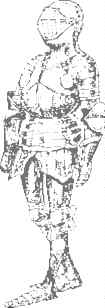Ghosts: good or evil?
All supernatural agents were regarded with the greatest suspicion, for they were far more likely to be the agents of the devil* than of God. When Hamlet sees the Ghost, his first instinct is to assume that they need to be protected from it: "Angels and ministers of grace defend us!" 1.4. 39). He continues, specifically keeping in mind both possibilities, that the Ghost is an agent of God or the devil (listen to a reading of the lines in original pronunciation*):
| God | the devil | |
| Be thou | a spirit of health or | goblin damned, |
| Bring with thee | airs from heaven or | blasts from hell, |
| Be thy intents | charitable or | wicked*. . . |
No wonder Hamlet sees the Ghost as having a "questionable" shape (see 1.4.40-43.)
Footnotes
-
"Damnèd spirits all"
. . . night's swift dragons cut the clouds full fast,
And yonder shines Aurora's harbinger;
At whose approach, ghosts, wand'ring here and there,
Troop home to churchyards: damnèd spirits all,
That in crossways and floods have burial,
Already to their wormy beds are gone.
(A Midsummer Night's Dream, 3.2.379-84.) -
Angels and ministers of grace
Listen to the speech:
-
Wicked or charitable
The last line has been rearranged to show the opposition clearly.
-
Who sees ghosts?
The ghost may be subjective, seen only by one person: Macbeth is the only one to see Banquo's ghost, and Gertrude does not see the Ghost in the later scene of Hamlet. Or objective, seen by all: the opening scenes of Hamlet, and the many apparitions that appear in Rome the night before Caesar is assassinated in Julius Caesar.
The teaching of the reformed Church was that the dead cannot return (Hamlet says as much, speaking of death as "The undiscovered country from whose bourn / No traveller returns [3.1.79-80]). Yet there were many contemporary accounts of ghosts, many of which achieved wide circulation, and it is clear that not everyone accepted the official doctrine that they were evil spirits in disguise.
-
Did the Ghost taint Hamlet's mind?
But howsomever thou pursues this act,
Taint not thy mind, nor let thy soul contrive
Against thy mother aught. Leave her to heaven.
(1.5.84-86)
In telling Hamlet not to "taint" his mind, the Ghost involves Hamlet in a contradiction: he is to revenge his father, but to take no action against his mother, because she will be punished in heaven. But if she will be punished by God, why not (as Christian doctrine required) leave Claudius to heaven also? Hamlet does, after all, fear that the Ghost may be tempting him:
The spirit that I have seen
May be a devil, and the devil hath power
T'assume a pleasing shape, yea, and perhaps
Out of my weakness and my melancholy,
As he is very potent with such spirits,
Abuses me to damn me.
(2.2.605-10)
Shakespeare's audience would probably not have considered this a mere rationalization or excuse to procrastinate.
